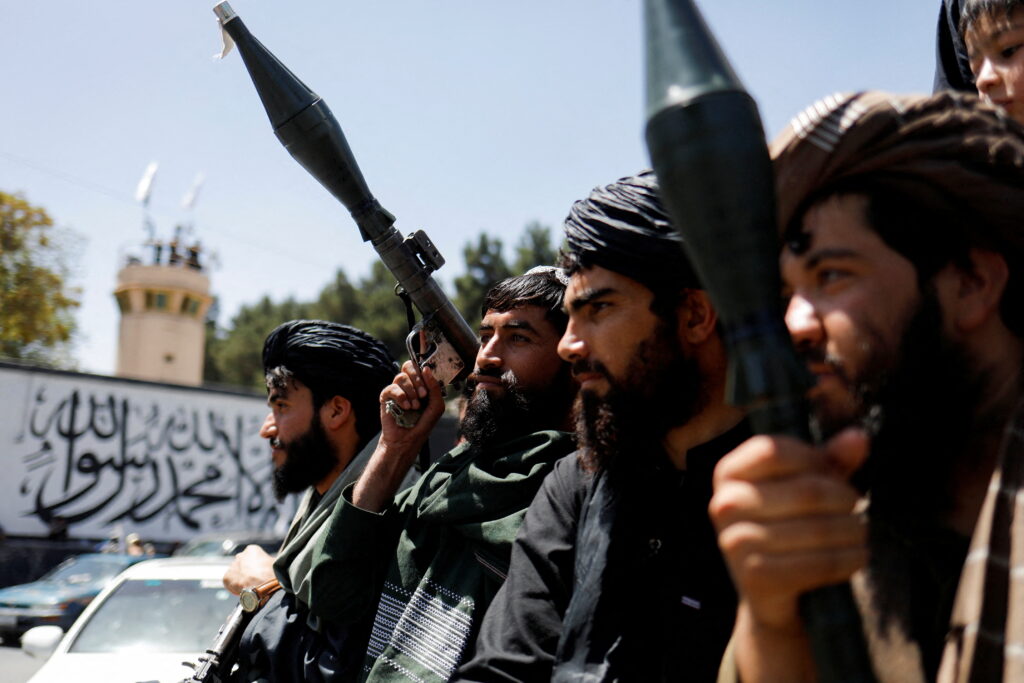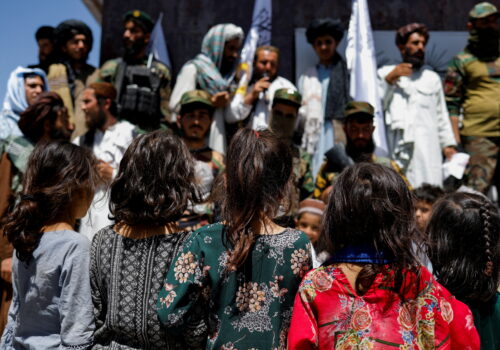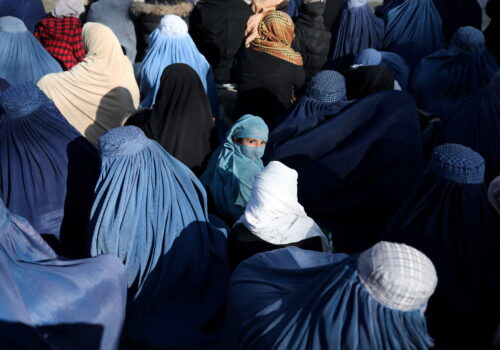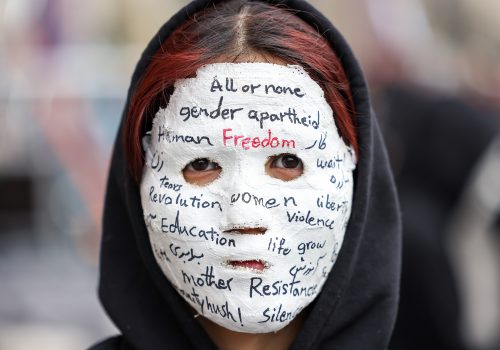Since the formation of modern Afghanistan, the country has grappled with political and social debates on the legal reforms needed to improve the status of women.
Afghan women won the right to vote as early as 1919, a year before the nineteenth amendment gave women in the United States the right to vote. In the 1960s and 1970s, the women of Afghanistan exercised political agency, and a new constitution guaranteed equal rights. In the formation of the 1965 cabinet of ministers, women were included at top levels in the government: They were appointed as parliamentarians, senators, judges, and ministers. Although women’s rights in Afghanistan have a turbulent past, this history of struggle—and gains—by Afghan women for equal rights is a reminder that Taliban rule is not the norm.
In the 1990s, the Taliban systematically deprived women of their basic rights. After the group was removed from power in 2001, Afghanistan made significant but insufficient legal progress in the realization of women’s rights. Since returning to power in 2021, the Taliban has brought back its oppression of women.
The Taliban’s widespread and institutionalized gender-based persecution violates core international human rights law. It may also require an international criminal law response. The evidence is clear: The Taliban’s actions meet the threshold necessary for them to amount to the crime against humanity of gender persecution.
Although persecution has long been recognized under customary international law, it crystallized as an international crime after World War II. Persecution on the basis of gender is codified as a crime against humanity under Article 7 of the Rome Statute of the International Criminal Court. Persecution is defined as “the intentional and severe deprivation of fundamental rights contrary to international law by reason of the identity of the group or collectivity.” Article 7 proscribes persecution of “any identifiable group or collectivity on political, racial, national, ethnic, cultural, religious, gender,” and other grounds.
To determine whether the Taliban’s institutionalized gender-based oppression constitutes the crime against humanity of persecution, five elements of the crime need to be established.
Element 1: Deprivation of fundamental rights
“Fundamental rights” within the Rome Statute are generally accepted as the rights protected under the Universal Declaration of Human Rights, International Covenant on Civil and Political Rights (ICCPR), and International Covenant on Economic, Social and Cultural Rights (ICESCR), along with other international human rights treaties and rights under customary international law.
These instruments protect the right to life, freedom from discrimination, freedom of peaceful assembly, freedom of movement, freedom of speech, freedom of education, and the right to work, as well as other socioeconomic rights and fundamental rights.
Many of these rights are precisely the ones that the Taliban has attacked, as it has banned women from the public sphere. In effect, the Taliban has prevented women from exercising their basic human rights, and it is widely reported that the Taliban enforces its decrees through arbitrary arrests, forced disappearances, imprisonment and torture, public lashing, rape, and killings.
Afghanistan has ratified the ICCPR, ICESCR, and the Convention on the Elimination of All Forms of Discrimination against Women. According to the United Nations (UN) Office of the High Commissioner for Human Rights, the Taliban—as the de facto authority governing the country—assumes the treaty responsibilities of the state of Afghanistan. Therefore, in evaluating the Taliban’s institutionalized gender-based persecution, there are strong indications that its actions may constitute violations of fundamental rights contrary to international law. UN experts have also maintained that the Taliban’s treatment of women “could amount to persecution.”
Element 2: Targeting a person or persons based on group or collective identity
The Taliban’s ideology and model of governance is based on gender-based persecution. Since August 2021, the Taliban has issued more than one hundred and fifty decrees and more than eighty of them are directed toward banning and limiting women’s access to their most fundamental rights. Studying the decrees closely, it is clear that the Taliban is targeting women, girls, and others on the basis of their perceived gender identity.
Element 3: Persecution on the basis of political, racial, national, ethnic, cultural, religious, or gender grounds
While discussing the Taliban’s gender-based oppression, it’s also important to recognize the group’s particularly deep hostilities toward ethnic and religious minorities. In the recent wave of arbitrary arrests of women for not following Taliban’s dress code for women, or “bad hijabs,“ the Taliban has deliberately focused its operations on predominantly Hazara- and Tajik-populated areas. Based on the accounts of the women detained, Taliban fighters used racial slurs while carrying out arrests. A video of a Taliban cleric has been widely circulated on social media, in which he specifically orders the punishment of Hazara women who do not observe the Taliban’s dress code.
The history of the Taliban’s large-scale brutality toward Hazara and Tajiks in Afghanistan is well-documented by Human Rights Watch and Open Society Foundation. The Taliban’s massacres of civilians in Mazar-e-Sharif, Yakaolang, Robatak Pass, Shamali Valley, and Sar-e-Pul Province, attest to the group’s deeply rooted hostility toward the Hazara and Tajik ethnic groups. Human Rights Watch stated that abuses and massacres such as those at Yakaolang and Robatak “have frequently been of such a scale and duration that they could not have been carried out without the knowledge and consent of senior Taliban commanders.”
Against this backdrop, the Taliban’s recent wave of arrests targeting women from Hazara and Tajik areas indicate the group’s persecutory conduct against these two ethnic groups based on gender.
Element 4: Acts referred to in Article 7(1) or within the jurisdiction of the ICC
Article 7(1) of the Rome Statute of the International Criminal Court includes murder, torture, rape, and “other inhumane acts causing great suffering, or serious injury to body or mental or physical health.” The Taliban has forced women in Afghanistan to drop careers and educational dreams they have spent their whole lives pursuing, while losing freedom of movement and agency. In addition to reports of arbitrary arrests and torture, the alarming rise in suicides among young women underscores the mental trauma plaguing Afghan women.
Element 5: A widespread or systematic attack directed at a civilian population
The Taliban’s gender-based persecution fulfills the Rome Statute’s requirement for crimes against humanity to be “widespread” or “systematic” and intended toward a civilian population.
That is plainly seen in the Taliban’s erosion of women’s rights through decrees and edicts enforced through its notorious Ministry for the Propagation of Virtue and the Prevention of Vice and the recently established High Directorate of Supervision and Prosecution of Decrees and Edicts.
The Taliban’s decrees and policies are treated as laws that apply to all women and girls—a specific civilian population—and their widespread brutal enforcement demonstrates the systematic nature of the Taliban’s gender-based persecution. By preventing women from becoming doctors, lawyers, and professionals in other sectors, the Taliban’s policies will ultimately result in restricting women’s access to health care and justice in the future.
Consequently, the Taliban’s treatment of women constitutes a clear violation of international law norms and principles, specifically the crime against humanity of gender persecution under international criminal law, as well as serious violations of the rights to equality and nondiscrimination under international human rights law.
The Taliban’s systematic subjugation of women is similar to what an apartheid regime does. UN experts, including in the recent report from the special rapporteur on Afghanistan, have maintained that the Taliban’s treatment of women could be described as gender apartheid. However, the term gender apartheid is not yet formally codified under international law.
In March 2023, a group of prominent Afghan and Iranian jurists and women’s rights defenders launched the End Gender Apartheid Campaign, urging the international community to expand the legal definition of apartheid and to codify the crime of gender apartheid in the potential crimes against humanity treaty presently under consideration by the UN General Assembly’s Sixth Committee. Doing so would be one important step on the path to holding the Taliban accountable for the totality of its crimes. Therefore, the inclusion of gender apartheid in the draft crimes against humanity convention can reinforce the existing crime against humanity of gender persecution by covering a wide range of acts and intent in situations like Afghanistan and Iran.
Azadah Raz Mohammad is a legal advisor for the Strategic Litigation Project at the Atlantic Council and a PhD candidate at the University of Melbourne.
Further reading
Fri, Mar 8, 2024
This International Women’s Day, hold the Taliban to account for gender apartheid
New Atlanticist By Azadah Raz Mohammad, Metra Mehran
Gender apartheid must be included as a standalone crime against humanity in international law. The United Nations has an opportunity to make that happen.
Thu, Mar 7, 2024
Twice under the Taliban: The repeated nightmare of my generation
New Atlanticist By
The deepening human rights crisis under the Taliban underscores the dire need for global attention on the plight of Afghanistan’s women.
Thu, Oct 5, 2023
Gender apartheid is a horror. Now the United Nations can make it a crime against humanity.
New Atlanticist By Gissou Nia
The international community has an opportunity to codify the crime of gender apartheid in the United Nations’ crimes against humanity treaty. Learn more about gender apartheid from the Atlantic Council’s Gissou Nia.
Image: Taliban soldiers celebrate on the second anniversary of the fall of Kabul on a street near the US embassy in Kabul, Afghanistan, August 15, 2023. REUTERS/Ali Khara.



